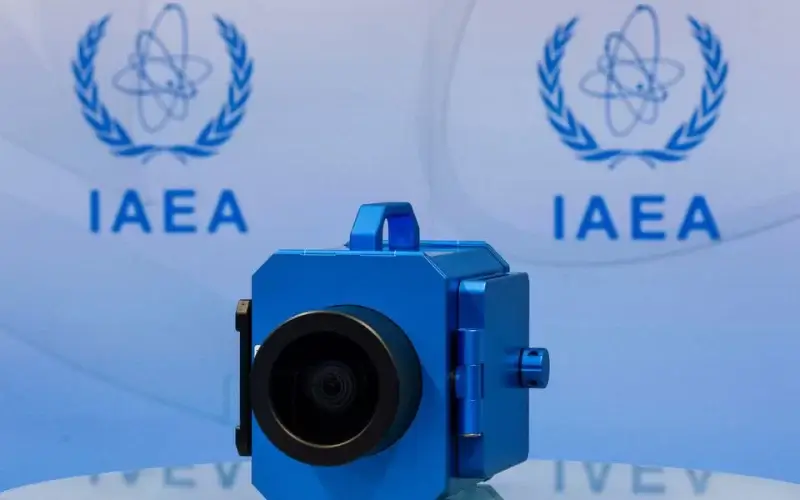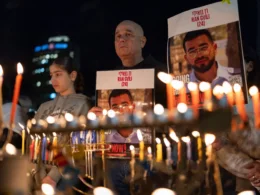The head of the Islamic Republic of Iran's Atomic Energy Organization announced Monday that Iran would continue to keep the United Nations nuclear watchdog's cameras off until the nuclear agreement is once again signed. The announcement comes as the West and Tehran are currently in a stalemate, with no luck in re-negotiating the 2015-era Joint Comprehensive Plan of Action (JCPOA).
According to media reports, Iran’s top energy chief, Mohammad Eslami explained that Iran would not agree to address allegations from the UN over unexplained uranium traces demanded by the International Atomic Energy Agency (IAEA).
"This announcement is another symptom of how the West has failed to bring pressure to bear on Iran to force it to limit its nuclear program and institute stronger monitoring arrangements, not to mention penalize Tehran's atomic advances," explained Andrea Stricker, a research fellow on nonproliferation at the Foundation for Defense of Democracies (FDD), a Washington D.C.-based think tank.
"The P5+1 agreed to close the IAEA's pre-2015 probe into the possible military dimensions of Iran's nuclear program, and so Tehran has this as a convenient fallback to refuse cooperation. However, the IAEA cannot limit future investigations, so Iran ended up being faced with its past and ongoing nuclear weapons activities," said Stricker.
The nuclear chief argued that the former nuclear agreement had cleared the Islamic Republic of possible military activities. Critics of the accord and Western intelligence sources in the past and present have stated that Iran's nuclear program has possible numerous military dimensions (PMD), arguing for the UN and IAEA to address such issues.
However, according to experts like Stricker, Iran's PMD case was never cleared and "only removed as an IAEA agenda item." "The 2015 accord required the IAEA to issue a perfunctory report on the PMD allegations, and despite Iran's lies and obfuscations, the IAEA Board of Governors and UN Security Council voted to close the issue. The investigation restarted in 2018 when Israel stole Iran's nuclear archive, and new questions emerged for the IAEA," said Stricker.
In mid-June, the 35-nation Board of Governors of the IAEA, except for Russia and China, overwhelmingly passed a resolution criticizing Iran for failing to explain uranium traces found at several undeclared nuclear sites. According to the resolution's text, the Board of Governors found that Iran had provided insufficient cooperation and called on the regime to engage with the watchdog "without delay." According to Iranian-state media, Eslami pointed out that the IAEA and the Board of Governors previously stated that PMD cases and locations were closed under the 2015 agreement, meaning that such measures will not face further examination.
After the IAEA's decision in June, Iran informed the organization that it had removed IAEA equipment, including several cameras installed in various nuclear sites under the 2015 pact with world powers. Eslami reiterated the Islamic government's stance on the IAEA monitoring measures, stating that the only way for the IAEA's cameras to be active again is if the West returns to the 2015 accord without any "mischievous" actions.
The 2015 nuclear agreement between Iran’s regime and Western powers has been an issue that lingers today. When President Obama and his team decided to negotiate with Tehran over its nuclear program, many foreign policy experts and members of Congress were critical of the administration's approach, given the enormous number of concessions the President and other Western allies offered. The President defended the deal against criticism from members of Congress and Israeli officials, arguing that Iran would abide by the terms of the agreement and moderate overtime.
When the Trump administration revoked the 2015 nuclear agreement with Iran and enacted economic sanctions for violating the deal's terms, the regime faced new pressure that saw the Iranian economy fall and halted some of Iran's nuclear activities. Under the Biden administration, America and its allies have engaged in renewed negotiations with Tehran, decreasing pressure on the regime and promising to offer concessions. While administration officials continue to advocate for talks with Iran, reports from various media outlets over the past few years revealed that Iran continues to build up its nuclear program with new underground centrifuges, enriched uranium, and military buildup.
Many experts like Stricker and members of Congress believe that the administration and its allies should take a more serious approach against the regime and do everything to deter Iranian nuclear aggression. "Washington and its European allies should call for an emergency IAEA board meeting and pass a resolution demanding Iran's immediate cooperation with the IAEA's investigation, a halt to Tehran's uranium enrichment, and Iran's restoration of full, intrusive IAEA monitoring. The Biden administration and Europe should restore their pre-2015 economic pressure campaign and end the nuclear deal by snapping UN Security Council sanctions on Iran," said Stricker.









